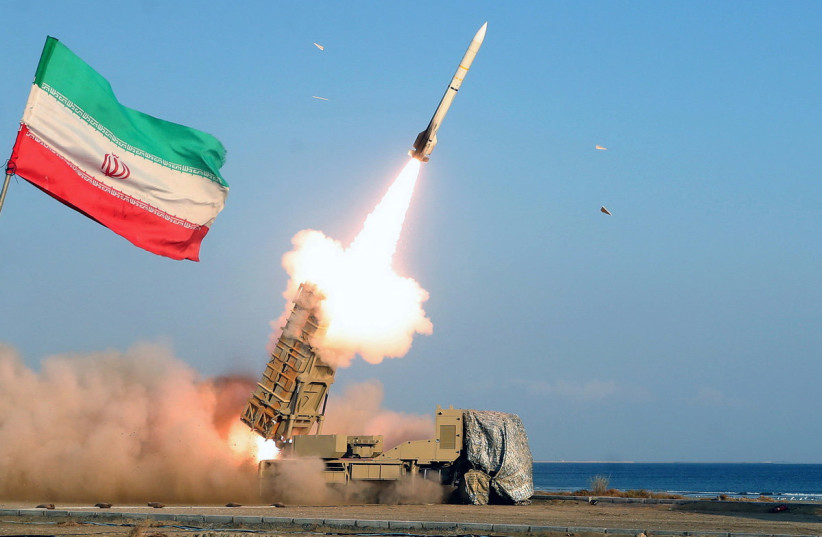In one of the most interesting interviews in Iranian pro-government media this past week, the regime appeared to explain its overall view on the Middle East today, with particular regard to Israel.
An interview was held with former Iranian Diplomat Hadi Afghahi, a man who is frequently quoted in Iranian media, and his views represent not only those of the regime but also a sort of trial balloon for how Tehran views the region; as an analyst he presents the Islamic Republic’s regional view. For instance, he recently praised the possibility of Turkish-Syrian reconciliation, noting that Syria and Saudi Arabia would soon reconcile.
In a long interview with Tasnim News, considered close to the IRGC, Afghahi was quoted at length about the “fate” of Israel and was asked to provide an assessment of recent Palestinian threats. He revealed many details about Iran’s emerging consensus on what is going on in Israel and in Iran’s attempts to threaten Israel.
The “third front” against Israel
Iran openly bragged about threatening Israel from a number of fronts in recent clashes with Palestinians, as well as along its borders over the last two weeks, while also believing that Israel is weakening internally. The interview shows that Iran sees itself as creating a “third” front against Israel.
Afghahi said that “Zionist positions were targeted by rockets from southern Lebanon, and shortly before Syria, Zionist positions were targeted in the Golan Heights. These attacks were a surprise for the Zionist regime.”

He argues that Iran should back this front against Israel, hinting that while Iran has backed various proxy and local groups – which it calls the “resistance axis” – that “we must also gradually enter the field of fighting.”
The term “we” could refer to the IRGC, as well as hinting at the fact that threats will emerge. “Now such attacks may be carried out from Yemen, Iraq, Syria and Lebanon,” Iran has now reconciled with Saudi Arabia, meaning it could afford to shift resources from Yemen to Iraq. This interview may be one of the first acknowledgments of the strategy.
The ”unity” of Palestinian and Iranian proxies against Israel
Another issue the interview mentions is what it calls the “unity of the field,” an issue The Jerusalem Post reported about recently, noting how Iran sought to kick-start a multi-front war against Israel. In the interview, Iran’s desire to unite Palestinians in Gaza and the West Bank, Lebanon, Syria and elsewhere in this “unity front” is clear. “Therefore, missile attacks from southern Lebanon and Syria were the initial message of ‘the unity of the fields’ to Tel Aviv [Jerusalem],” he says.
Iran thinks Israel is afraid to respond
The interview includes a discussion of how Prime Minister Benjamin Netanyahu’s responded to Iran’s attempts. The report says that “Netanyahu is testing whether he can have a limited conflict with Iran in order to end internal divisions and street protests by building a consensus against Iran. The Zionist regime attacked the positions of Iranian advisers in Syria and martyred several Iranian advisers. Tehran dealt with this attack intelligently and did not respond to it, because it was well aware of Netanyahu’s evil intentions, so Netanyahu’s situation is very fragile and I don’t think he can easily survive this incident,” Afghahi said.
The interview also notes that “the attack from the south of Lebanon and the operation in Tel Aviv; look at the missile attack from Syria on the Golan Heights, what was the reaction of the Zionist army to these strikes? A few Israeli warplanes took off, hit a few targets and turned back, and then the Tel Aviv authorities claimed, ‘we don’t intend to start a war.’…This shows that Israel is weakening.” Iran interpreted Israel’s responses to the rocket fire from Lebanon and Syria as it being deterred by Iran; that it is concerned about a larger war.
Iran believes the US is concerned about Israel
Afghani asserts that the US is concerned about what has been happening in the region, noting that the US has deployed a nuclear submarine to the Middle East, that Israel is weakening amid internal protests and that US-Israel relations have soured since Netanyahu retook office.
“Now the relationship between America and the Zionist regime has reached its worst state, despite this, America knows that Israel is protecting its interests in the region. The Zionist regime can start proxy wars and disturb the region, so the Americans say, ‘we have a problem with Netanyahu, a tactical problem’, but the weakening of Israel is considered a strategic crisis for Washington.” It’s not clear from the article why Iran assumes Israel’s strategic situation is weakening.
Iran believes that internal protests are more important than Tehran’s support for Palestinians
The report closely examines Israel’s zig-zag on the judicial reforms and Netanyahu’s relations with his coalition members. The analyst argues that recent statements from Israeli officials note that “Israel is destroying itself with these demonstrations.” In essence, Iran assesses that its own backing of Palestinian groups has not had much affect but that Israel’s internal domestic problems could be its undoing.
The report closely examines Israel’s zig-zag on the judicial reforms and Netanyahu’s relations with his coalition members. The analyst argues that recent statements from Israeli officials note that “Israel is destroying itself with these demonstrations.” In essence, Iran assesses that its own backing of Palestinian groups has not had much affect but that Israel’s internal domestic problems could be its undoing.
In essence, Iran thinks Israel’s security forces are strong, it believes that it can only weaken Israel by waiting, or by encouraging proxy forces to threaten it.
